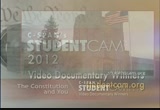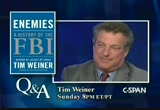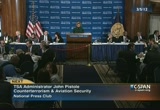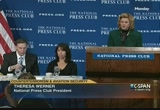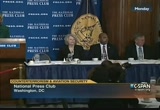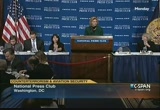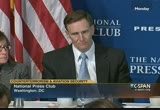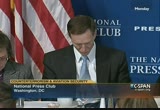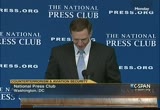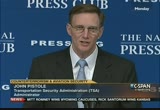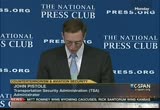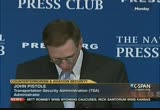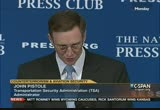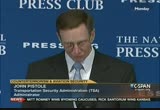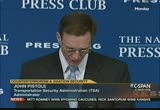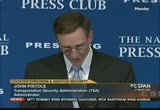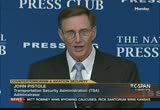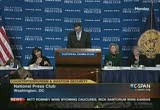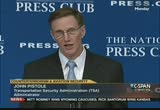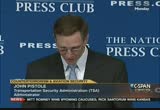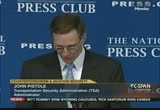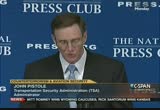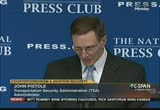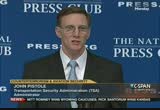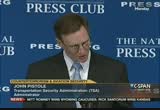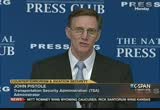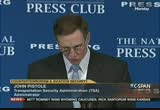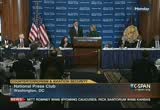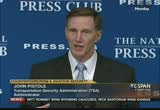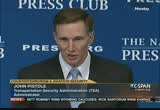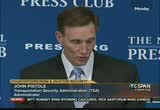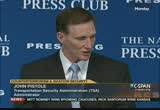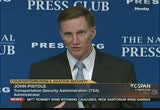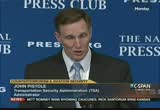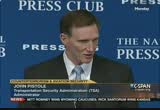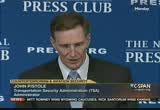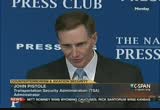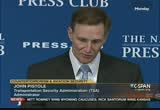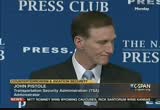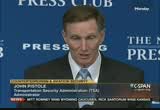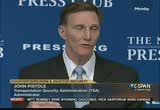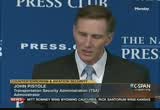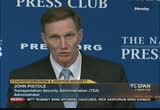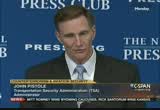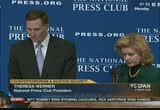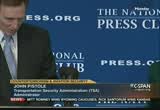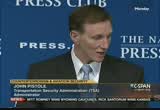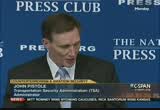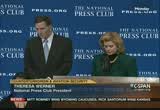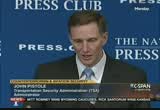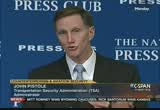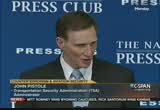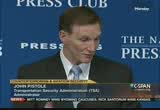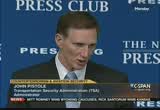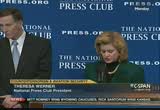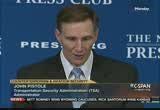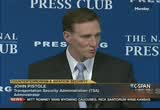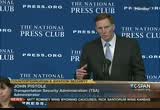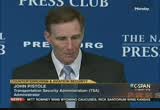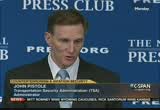tv Future of Aviation Security CSPAN March 10, 2012 7:00pm-8:00pm EST
7:00 pm
student cam documentary competition. they showed which part of the constitution is important to them and why. watch all the winning videos at our website, studentcam.org and join us mornings in april as we show the top 27 videos on c-span and we'll talk with the winners during "washington journal." >> tomorrow on "washington journal," form shell oil president john hoff maicer discusses the future of gas prices in the u.s. political columnist tomorrow baxter looks as presidential elections. "washington journal" live at 7:00 a.m. eastern on c-span. >> fire j. edgar hoover?
7:01 pm
i do not think he would have gotten away with it. hoover stands alone. he is like the washington monument. he stands alone like a statue. as one of the most powerful men who had ever served washington in the 21st century. 48 years, 11 presidents. there is no one like him. a great deal of what we know for what we think we know about him is a myth and legend. >> tim weiner on enemies -- a history of the fbi. >> next we will hear remarks from john pistole. he talks about how his agency
7:02 pm
has changed since 9/11 and why the jfk airport in new york city has been the ninth airport to expedite screening programs for frequent fliers. this is hosted by the national press club. this is an hour. >> good afternoon. welcome to the national press club. my name is theresa warner. we are the world leading professional organization for journalists. we are committed to our programs such as this wall fostering free press worldwide. for more information about the national press club, please visit our website, www.press.org. to donate, please visit
7:03 pm
www.press.org/institute. on behalf of our members, i would like to welcome our speaker and those of you attending our events. our head table includes the guest speaker and journalists who are working members. if you hear applause in our audience, general members of the public's are attending. i would also like to welcome our c-span radio audience. we have a weekly pot cast of the national press club available on itunes -- pod cast of the national press club available on itunes. i will ask as many questions as time permits after our guest speaker talks. please stand up as i announced your name -- jeff from
7:04 pm
bloomberg. julio from telemundo. dave nickolson. michael boldon, "washington post." alsion, freelance journalist. ms. stone, "huffington post." jeff, al jazeera. rachel from global security newswire. [applause] as the new york times noted, soon after he became the fifth head of transportation security
7:05 pm
administration in july of 2010, john pistole is thought and we did fate of everything americans hate about airport security in a post-9/11 world. every time we are asked to take off our shoes at the airport and pull out our laptops or submit to an uncomfortable packed down, we have his agency to blame. he spent most of his career chasing bad guys for the fbi. my hope is that whenever people want to call me, they recognize that we are doing everything we can to work with people to provide the best possible security. pistole graduated from anderson university in indiana and indiana university law school in indianapolis. he joined the fbi in indianapolis. he went on to work in new york before heading to the headquarters in washington to supervise the organized crime section.
7:06 pm
since 1999 when he helped lead the inquiry into the crash of egypt flight 990 in nantucket, massachusetts, he has worked with the nation's highest profile cases involving national security. after the 9/11 attacks, he was put in charge of the fbi's extensive counter terrorism branch. he became the bureau's executive director of counterintelligence. he led a number of high-profile investigations including the breakup of a plot to blow up new york subways in 2009 and later that year the case of the would-be underwear bomber and christmas day. he also took part in the investigation of an attempted car bombing in times were in 2010. in 2004, he was named deputy director of the fbi and a serving in the number two position when police asked him to fulfill the top spot of the
7:07 pm
tsa. today he oversees 60,000 employees to provide security at more than 450 airports and through the federal air marshal service. his agency is also responsible for the security of the nation's pulse highways, railroads, ports, mass transit systems, and pipelines. it has been nearly a decade since the 9/11 attacks. they have changed their security system on a more intelligence- driven model. i am sure the administrator will have much to say about all of this. please welcome our luncheon guest, john pistole. [applause] >> thank you for most of the introduction anyway. i have been discovered in a lot
7:08 pm
of ways and that was a compilation of opinions. good afternoon. it is an honor to be here today. i do and speak of the continuing evolution in the place of the global counter-terrorism community and our efforts to strengthen our nation's security to the implementation of risk- based and intelligence driven initiatives. last fall, we marked the 10th anniversary of both the 9/11 attacks and the legislation known as atsa. it was passed by congress and signed by the president several days later. they are both part of our country's response to the 9/11 attacks. we continued to be proud of how tsa staff and operational --
7:09 pm
became operational in less than one year. people do not know that the building of tsa includes the largest mobilization of federal work force since world war ii. as chief administrator i have been privileged to know and work with a number of dedicated individuals know our agency's story better than anyone. they helped write it. they are dedicated public servants. john was the first administrator. jim came over from the coast guard. david stone and kip hally. they are just a handful of public servants given the urgent task of creating a new security
7:10 pm
agency whose mission has always been to protect our nation's transportation systems to ensure the freedom of movement for people in commerce. gail served as the active administrator before my arrival. the american people are more secure because of her outstanding service. at its core, the concept of risk-based security demonstrates progression of the work tsa has been doing through its first decade of service. it is an understanding and acknowledgement that we are not in the business of eliminating all risk associated with traveling from point a to point b. this is inherent in everything we do. our job is to mitigate risk and reduce it as much as possible. before i go further, i want to
7:11 pm
take a moment and mention another significant anniversary within the tsa family. she mentioned the air marshal service. last friday, the men and women of the air marshal service who today compromise tsa's primary law enforcement component, celebrated their 50th anniversary of. the first-class a peace officers were sworn in a few years ago and began building a legacy of protection which today officers are polled every time they board an aircraft. the core mission is to protect the flying public has remained constant over the years. air marshals today have an ever expanding homeland security and work closely with other law enforcement agencies to accomplish their mission. they have to counter terrorism partners such as the national targeting center and many of the fbi joined task units.
7:12 pm
they are an integral part of everything we do in tsa. to help set the stage for the as security system we are building at tsa, it is helpful to take a look back and recall what security will collect prior to the september 11 attacks. as you are aware, what was in place there is little resemblance to the strong come up multi layered system that is in place today. that is especially true when you talk about aviation security. before september 11, there is one common know he's a system in place to check passenger names against terrorist names when it comes to flying. second, there is a wide array of threats when it comes to flying and passengers. third, the comprehensive federal requirements we're required for
7:13 pm
checking baggage. before 9/11, there was a lack of timely cooperation in both direction but at the federal level and the individual airports. i came to the fbi more than a year and a half ago. i worked the previous 26 years in a variety of positions at the fbi, almost exclusively in security matters. that has helped shape my approach to solidifying tsa's place within the national counter-terrorism continue one. every day, we strive to make sure that our system is time, a fishing, and coordinated as efficient and fficie
7:14 pm
coordinated as possible. we are constantly communicating with our front-line officers through shift briefings held several times a day. we have also forged partnerships with stakeholders' including airlines and airline partners. tsa has achieved a number of significant milestones during its first 10 years of service. these include things such as matching 100% of passengers flying into and out of the united states against government watch list to the secured flight program. it includes screening all cargo fly domestically. we also work with our international partners to screen 100 percent of high-risk cargo. we are also working with the same partners to screen 100% of cargo on planes by the end of
7:15 pm
this year. we all have innovative technology that screens for explosives. i would like to mention our viper teams. we currently have 25 but teams working across the country to prevent our destruct potential terrorist activities. in 2006, tsa has completed more than 190 comprehensive assessment for security programs in critical turning systems. we have seen the benefits of how these steps combined with multiple cleared securities across the different transportation sectors, which include opportunities we have
7:16 pm
for cutting edge technology. they help keep americans save each and every day. we screen nearly 6 billion passengers. think about that. 6 billion passengers. our front-line officers have detected thousands of firearms and thousands of of the prohibited items from entering the aircraft. in fact, more than 10 years after september 11, will still be tacked on average three to four firearms every day in carry-on bags and security checkpoints throughout the country. the good news is that has dropped slightly. we see the efficacy of advanced hundred technology ofat of passenger checkpoints throughout the united states. we assess the manner in which
7:17 pm
tsa maintains and operates these machines. they found that tsa was in compliance and there were radiation limits that were met. research and analysts', they believe that the potential health risk are minuscule. the finding also made by the u.s. public command issued a report last month. there is no perfect technology, but our technology gives us the best opportunity to detect metallic devices, including other types of devices which we are concerned the terrorist may be constructing as we speak. manufacturers continue to enhance the machines abilities and the privacy features of the machine. we continue to upgrade the
7:18 pm
software and stay ahead of the rapidly changing landscape. we maintain a high level of adaptability. it enables us to have an advantage. ait and other technologies help our officers attacked hundreds of illegal are prohibited items on passengers. this illustrates how effective our people processing and machines find those items either on the persons or in their backs. we highlight many of these good catches every week in blob post of loaded to -- uploaded to tsa.gov. there has been a number of incidences where items were hidden in shoes and hollowed out books.
7:19 pm
even exotic pets stop to passengers legs. as strange as some of these tales may be, they are a stark reminder that people are still trying to bring deadly weapons and other items onto their crops. our officers are detecting numerous items every day. our officers detected 19 guns in carry-on bags brought the country last presidents' day. -- throughout the country last president's day. we have also made significant steps to strengthen privacy protection for passenger with ait.ed we have a new privacy software.
7:20 pm
the software upgrade enhances privacy protection by eliminating passenger votes as pacific images and instead is replaced with a generic body outlined. the soccer also helps make the process more efficient. -- the software also helps make the process more efficient. these technologies do not stand alone. that is why we continue to strengthen our efforts in standard operating procedures throughout the roughly 450 airports we have secured. one of the ways we do this is by having a series of risk-based intelligence-based processes of aviation security. in to douse the 11th, we introduce several new security processes, including identifying airline pilots and providing them expedited screening.
7:21 pm
we have also made adjustments to screening for children 12 and under. perhaps most widely known security enhancements we have put in place is the tsa pre- chat. -- pre-check. it helps us move away from a one-size fits all security model. one-size fits all was necessary after 911 and has been effective, but thanks to technology and intelligence, we are able to move to a more better model. we can focus our resources of those passengers who pose the greatest risk, including those who are on the watch list. we also have a program for trusted travelers. we began the program last fall.
7:22 pm
since then, more than 460,000 passengers around the country have experienced expedited physical security screens through tsa pre-tax. the feedback we have been getting is -- pre-checks. the feedback we have been getting is positive. the airline's work with us to invite eligible passengers to opt into the initiative. we are able to extend tsa pre- check benefits to any u.s. citizen who is a member of one of their trusted travelers program. i encourage anyone who is interested to apply for old entry. if you get accepted, you get benefits at participating airports. by the end of this year, we expect to be offered passengers
7:23 pm
the expedited physical screen benefits associated with tsa pre-check because we have done a pre-screening of them before they get to the airport. we are constantly about quitting new ideas and adding strength to the layers of security we have. this allows officers to focus their attentions on travelers we believe are more likely to pose a threat to our transportation network. we're focusing our efforts in a more precise manner the also improves the overall traveling experience for people who fly in the u.s. every day. we will evaluate checkpoint procedures. our ability to find the proverbial needle in these tige hay stack is reduced.
7:24 pm
the pre-check is getting things done more quickly and more efficiently. our partnership the airlines and airports and all those who have an interest in this process. we will continue to make adjustments to our standard screening procedures for certain segments, such as travelers 12 and under. we're also using the risk- assessment model to drive airline efforts in the other way. we will extend the trusted travelers to include active airline members with a track card. service members will undergo the standard tsa pre-screening. if they are in good standing with the the part of defense,
7:25 pm
they will likely receive tsa pre-screening benefits, such as no longer having to remove their shoes or jackets and being able to keep the laptops in their briefcases. u.s. service members are entrusted to protect and defend our nations and our citizens with their lives. as we review and evaluate the effectiveness of these possible enhancements, it is possible that additional changes to the security screening process could be in the future. you want to provide security in the most efficient way. of course, there are unpredictable the second happen in the airport and no one is in guaranteed pre-screening.
7:26 pm
we appreciate the cooperation of all of our partners at the airlines and also the general public. there are economic benefits to strengthening aviation security, especially in the cargo facility to secure goods. the interconnectedness of the global economy requires that each and every link in the global supply chain be as strong as possible, whether it is for business or pleasure, the freedom to travel from place to place is fundamental to our way of life. to do so securely is a goal that everyone at tsa is committed to. thank you for inviting me here today. i am looking forward to your questions you may have. [applause] >> dimensions of the president's day alone how many guns and knives were found.
7:27 pm
-- you mentioned on president's day alone how many guns and knives were found. how many have a malicious intent? >> it depends on the jurisdiction on whether that passenger was cited or rested. they are always cited by us for trying to violate the security protocol. >> what happened to the puffer machines? >> the machines were constructed in a push to try to find explosives on persons. the idea was simply to have somebody walk into the machine and have a puff of air come on them. the explosive detection equipment with defects that. what we found is that we did not
7:28 pm
have sufficient testing done prior to deployment. basically some fundamental design features, for example, there was brought in from the floor to creep up of and so there were a lot of contaminants on the floor. simple design changes would have made that more effective. a decision was made to not fully deployed those machines and the few that have been deployed were taken out. they were put away. >> have you continuously monarch for people who are part of the pre-checked and tested traveler program? -- continuously pre-check people who are part of the pre-check and trusted traveler programs?
7:29 pm
>> those passengers are still going through physical screenings, a different type perhaps. weapons would be detected. we have comparison to the terrorist watch list everyday to make sure that no one is in that category. we did not talk about some of those things in the details because we do not care is to get those details. >> is everyone who seems nervous expected to be a terrorist? >> absolutely not. i have a daughter who traveled the other day and she is always nervous because she gets motion sickness. the behavioral pdetection officers look for those physical manifestations which may be of
7:30 pm
concern. given my fbi background, i am a firm believer in the benefits of that. of course, it could be something as simple as the situation with my daughter. >> the perceived threat of terrorist has changed since 9/11. does the tsa regularly review its screening procedures to adapt to new perceived threats? >> yes. we start every day with an intelligence briefing from around the world, not just u.s. intelligence, but worldwide. the best example goes to october 2010. we learned about the plot coming out of yemen with toner packages. we worked closely with industry
7:31 pm
and our counterparts overseas. we try to detect devices that are well-designed and well- concealed. we look at what stop we need to incorporate at the checkpoint for passengers or for cargo screening either here or overseas. >> given the increase of international trade and movement of people, what do you envision is a good cooperation with foreign countries? >> clearly we want to have security for passengers and cargo that is in line with what we have here. for those of you who have traveled abroad, at their airports, you know that they have a central airport and then the actual gate before you board the plane. you go through another set of
7:32 pm
security. those are tsa requirements for various reasons to make sure that every passenger getting on a flight to the u.s. has been thoroughly screened with tsa standards. there are airports around the world that fly directly to the u.s. with our partners abroad to make sure that we have the best security. ow much u.s.-bound cargo is screened? >> we believe over 90% of all cargo on those plans are currently being screened. our goal as i mentioned earlier is to have 100% of all that done by the end of this year there a
7:33 pm
risk-based model. >> what constitutes as high-risk cargo? >> we do not define its. we do not want the terrorists to go to our website and say, ok, this is high-risk. i will do something that is not high-risk. i will give you an example. the bombers from yemen for shipping computer printers anfrm chicago and paying $500 in shipping costs. from a security perspective, why with somebody be shipping computer printers from chicago when they can get it much less likely? it comes down to assessing and working closely with the cargo industry which has the
7:34 pm
permission of who the shipper is and what type of shipment it is. it comes down to trying to define and distinguish between known shippers and shipments and unknown shippers and shipments. >> how do you balance the intrusiveness and inconvenience of the security and? >> we want to make sure that everyone who gets on a plane in the united states that they have been thoroughly screened so there is not a terrorist on their who is wanting to blow up that airline. that being said, what we are doing with this risk-base model is to recognize that most of the passengers are not terrorists. how can we get them some expedited screening by doing more pre-screening?
7:35 pm
anytime i traveled, i flew aren't. we would never go through security screening. my protocol was to go to the security lane and have my credentials verified. learly prior to 9/11 we knew who were the trusted travelers. with that said, we can make a judgement decisions on tested travelers. it is all about doing pre- screening. >> how and travelers give informed consent when the tsa refuses to describe exactly how searches will be conducted? >> it is a challenging situation. we do not want to publish our exact protocols.
7:36 pm
innovative and creative terrorists both with the yemen printers and underwear bomber -- last summer we saw that there was information about the same terrorists who were looking at ways to beat our new machines by surgically implanting devices, bombs, so they could get onto planes. they were hoping that our advanced technology would not pick that up. that is the type of balance that we run every day all trying to respect the privacy and dignity of all involved. we do not get it right every time when there are millions of
7:37 pm
people that we screen. we do try to accomplish our job in the most professional way. we work for that. we welcome feedback from the traveling public. i hear from travelers on a fairly regular basis. we work with them to address their needs. in december, we initiated something called tsa cares. there is a number you can call, especially if you are elderly are have medical conditions which may require different types of screening. with tsa cares hot line, if you call in advance, it gives us a chance to work the passenger in a way in which we can expedite the screening process what respecting the privacy and dignity and insuring that there is not a terrorist trying to use the person unwittingly for bad
7:38 pm
means. >> the tsa is sometimes in the headlines for a reason that does not relate to catching terrorists. for example, a mother was detained for caring -- carrying breast pumps. how do you respond to the public's anchor? -- anger? >> it is a challenge to provide 100% total customer satisfaction when there are 450 airports. on many days, we do not do that. there are opportunities for us every day to engage with the public in ways that most agencies are businesses -that have 100% satisfaction with that
7:39 pm
many customers on a daily basis. i do not know any of government agencies with the records. it really comes down to the better informed passenger can be before they get to the airport by looking at the tsa.gov websites, we have a lot of tips for how to pack and how to travel. we have a list of what items you can and cannot take on and what can go into your checked bag. a lot of people, gun owners for example, they can take their guns into the check back, but there is a protocol for doing that. depending on where you are, you just need to make sure that you follow the protocols for the local police. declare that weapon and package it appropriately. there are subtle nuances and
7:40 pm
subtleties. >> following the rules of what you can and cannot take, watching customers take on little liquid bottles. >> now we are getting onto math. 3-1-1 ithe roleule of goes back to the terrorist from the united kingdom who took sports drinks and drain dout the drink, and filled with liquid explosives. the purpose was that when two of those live with our combined, it would cause an explosion. prior to that, we did not have a
7:41 pm
slick with limitations. we know that in certain amounts, terrorists can combine those in a way that would potentially cause a catastrophic event on an aircraft. when we look at multiple, small items, it becomes an issue of how effective is that if they are the equivalency of the same larger unit. these to be some point at which we look at the person as much as the sights and they are carrying. part of that is where the pre- screening comes in and the behavioral officers. some of the items we list makes sense and some we are revisiting to see what we can do to make its makes sense. again, there are a lot of
7:42 pm
challenges and opportunities in that regard. >> how do you justify the tsa having more than 65,000 employees which is more than the department of state, energy, labor, and education combined? >> bottom line is that it is a huge job to provide transportation security not only at the 450 airports, but also working with our state and local partners, mass-transit, railroads, the metric system, the buses. there are hundreds of people traveling in buses and subways every day more than airplanes. that is part of enabling legislation that congress passed. you need to be responsible for
7:43 pm
all modes of transportation security. how do we do that? what we do in terms of efficiency is we have tens of thousands of employees. today 4% of those are veterans, men and women who served in the armed forces -- 40% of those are the veterans, men and women who served in the armed forces. during the morning and afternoon we have the rush hours. rather than having people on full-time status throughout the course of the day, up from an efficiency model, we have a number of part-time people in the morning and same thing in the afternoon. we try to find the exact model that makes sense to provide the most effective security in the most efficient way. >> if you were fully granted your wish list, how much bigger
7:44 pm
with the budget be and how we allocate the extra money? >> ex-testified last week for a provision committee where we were asking for less money than last time. that is my official statement. [laughter] i think that we are well-funded right now. there are additional things we can do. if the administration in congress was just too altered things, especially on the cargo side, i can see the possibility of some efficiency through this risc-based security model. we will be interested in seeing what the methods are from all of this. >> is there still a place for air marshals? are they a good use of tax
7:45 pm
payers' dollars? >> they provide i believe that extra layer of security in the case that an individual who did that come off on any one's radar, say an extremist, if intent, and can conteill construct a non-metallic bond that could bring down an aircraft, it in the person is here in the states and had not been detected by anybody, see something, say something. if that person is able to get through and walk through a metal detector because they do not have metal on them and get onto the plane, the federal air marshals are there as the last
7:46 pm
line of defense for the u.s. government. i see them as a voluble aspect of our multiple cleared security -- valuable aspect of our multiple-cleared security. they are a deterrent for terrorist. they are aware that we have air marshals. they see that as a deterrent. we also have a number of pilots who are armed. even if there is not a federal marshal on board, it is possible there will be an armed a pilot on board. that way if the terrorists tried to get into the cockpit, the pilot would have the resources defend himself.
7:47 pm
with the times or bomber, he was prevented because someone said something. if something is out of whack and i have concerns about this person for this event, it makes sense to let the '40's look into it and resolve those concerns. as far as identifying a particular terrorist, i know from my fbi experience that a number of investigations were initiative based on that same principle. we did not call it see something, say something, but we did know that if someone is doing something suspicious, if they are doing something that is not good, there is value in the public being aware of what is going on and reporting suspicious activity. >> does the tsa have any procedures in place to
7:48 pm
responding to a slow-acting weapon on an airplane? >> there are a number of particles that have been practiced and gained out if you will. the short answer is, yes. depending on what type of toxic or poison it may be with different levels of effectiveness, the short answer is yes. >> most people think of the tsa as an airline passenger screener. can you tell us more about the teams?ine viper >> terrorist are deterred by armed law enforcement, k nine teams, -- k-9 teams. we know from the london attacks
7:49 pm
that if they are suicide bombers, we saw some of the honors in london look up and see the t.v. it is basically a testimonial to that person's suicide mission. but for those who want to do something in terms of leaving a bomb or trying to get off, our t.v. can be affective. officers and k-9 teams are effective. perez can be tried to do surveillance on a station or airport -- terrorists can try to
7:50 pm
do surveillance on a station or an airport. say next tuesday, they try. they try again on another tuesday. since the next tuesday they try, there is a 13viper -- viper team. it is always involving bell local police authority. it is a deterrent for potential terrorist. >> what is being done by the tsa in how to manage the no-fly list? how can they better catch potential terrorists without violating liberties?
7:51 pm
>> if you are on the no-fly list and there is information about you that you are a potential threat to aviation, that is a reason for denying you the privilege of flagging. that being said, there are others who are not in that status but who receive additional scrutiny because of the derogatory information available about them. the lack of transparency gets to the point of revealing what that derogatory information is. in some instances, there is the old adage that there is a collection of information.
7:52 pm
intelligence collects that information. that's the background on that. that is why we have intelligence briefings every day. we look at the next several days in terms of who are no flight individuals who are wanting to fly and who are known who need additional scrutiny. we look to see if there are any patterns are groupings of people we should be focused on from a risk-based security standpoint. >> over 500 screens have been arrested for stealing from passengers' bags. do you see this as a security flaw? can they not be bribed to put dangerous items in them? >> i am not sure where that number came from. there are many other agencies
7:53 pm
who have been arrested for theft. that is definitely a problem. it is also a security concern. that is why we use a certain system particularly in that area to deter theft in those instances. we have been able to rebut situations of allegations by watching surveillance of what exactly happens. we have taken steps with the inspector general and the u.s. attorney's office to have them not only fired, but also prosecuted.
7:54 pm
>> what about privatization proposals? >> the tsa was created for the core purpose of preventing another 9/11. philosophically at its core, i see tsa as a u.s.-government- run agency. one of the issues for me from the costs perspective is to have a privatized airports that has cost more for the taxpayers. they are paying for the privatized screenings. it is still a to follow the same procedures and protocols that we use at every other airports. that is one of the reasons we have not seen many airports
7:55 pm
actually applied them. we have 16 currently being run as privatized screening workforces. san francisco cisco is one of the largest. we have two new airports that have applied. there is a change in the way that we treat applications. we will be working with congress to see how we can best implement the congressional under the new legislation. >> do you worry that purging the public to report suspicious behavior could cause paranoia? -- urging the public to report suspicious behavior could cause paranoia? >> i am not worried about that. it is common sense that if people are aware that there is some action that can be taken -- the other side of that is that
7:56 pm
every once in awhile there can be poison pen and e-mails from someone wants to besmirch someone's reputation. you look into it and you find out pretty quickly that is not the case. the person who made the false accusation is usually charged with criminal offense in that regard. but i think it is common sense that we should work together instead of its of the government's responsibility to do this. it is all of our responsibility. we share a common goal to provide the best security in transportation. let's just do that. that is what works best. >> what work is the tsa doing with highway transportation? what are their accomplishments?
7:57 pm
>> we were closely with over the road bosses. -- work closely with the over the road busses. especially those to have hazardous items. we work with and to strengthen their security protocols. when we have grant funding available, we tried to adjust the height as the hon. areas screeningrms of equipment or whatever it may be, we also have regulatory for who is working as commercial drivers and works closely with industry to make sure that their workers have been vetted against the terrorist database.
7:58 pm
>> we are almost out of time. i have a couple of housekeeping matters to take care of. we have upcoming election speakers. march 14, we have former representative patrick kennedy to talk about the mental parody act. april 5, the commissioner of internal revenue service. second, i would like to present our guest with the traditional national press club mug. it holds more than 3 ounces of liquid. [laughter] last question, have never been submitted to a pac-10 of going through airport security -- have you ever been submitted to a while going through
7:59 pm
airport security? >> yes. russianing through eigha hub. the alarm went off. dick asked me to step aside. they did not know who i was. -- they asked me to step aside. they did not know who i was. he did a very thorough job. >> thank you. [applause] you can buy more information about the national press, on our website. also if you would like a copy of our program, go to www.press.org. www.press.org.
217 Views
IN COLLECTIONS
CSPAN Television Archive
Television Archive  Television Archive News Search Service
Television Archive News Search Service 
Uploaded by TV Archive on

 Live Music Archive
Live Music Archive Librivox Free Audio
Librivox Free Audio Metropolitan Museum
Metropolitan Museum Cleveland Museum of Art
Cleveland Museum of Art Internet Arcade
Internet Arcade Console Living Room
Console Living Room Books to Borrow
Books to Borrow Open Library
Open Library TV News
TV News Understanding 9/11
Understanding 9/11